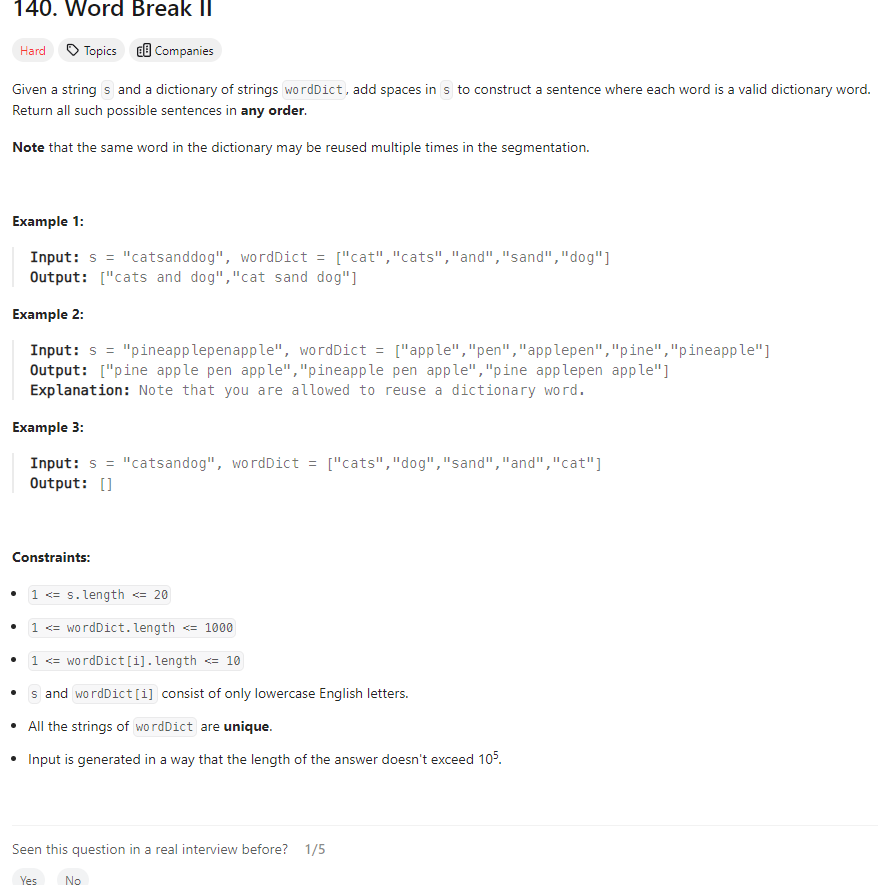Problem Statement

Backtrack Approach - TLE
class Solution:
def wordBreak(self, s: str, wordDict: List[str]) -> List[str]:
len_s = len(s)
len_wordDict = len(wordDict)
word_len_dict = defaultdict(int)
res = set()
memo = defaultdict()
for word in wordDict:
word_len_dict[word] = len(word)
def isValid(arr):
curr_word = ''.join(arr)
return curr_word == s
def dfs(index, curr_len, curr):
if curr_len == len_s:
if isValid(curr):
res.add(' '.join(curr))
return
if index == len_wordDict:
return
if curr_len > len_s:
return
for j in range(len_wordDict):
curr_word = wordDict[j]
if curr_word in s:
dfs(j, curr_len + word_len_dict[curr_word], curr + [curr_word])
dfs(0, 0, [])
return list(res)
Memoization Approach
class Solution:
def wordBreak(self, s: str, wordDict: List[str]) -> List[str]:
wordSet = set(wordDict)
memo = {}
def backtrack(start):
if start in memo:
return memo[start]
if start == len(s):
return ['']
sentences = []
for end in range(start + 1, len(s) + 1):
word = s[start:end]
if word in wordSet:
for sentence in backtrack(end):
if sentence:
sentences.append(word + ' ' + sentence)
else:
sentences.append(word)
memo[start] = sentences
return sentences
return backtrack(0)
Editorial
Approach 1: Backtracking
class Solution:
def wordBreak(self, s: str, wordDict: List[str]) -> List[str]:
# Convert wordDict to a set for O(1) lookups
word_set = set(wordDict)
results = []
# Start the backtracking process
self._backtrack(s, word_set, [], results, 0)
return results
def _backtrack(
self,
s: str,
word_set: set,
current_sentence: List[str],
results: List[str],
start_index: int,
):
# If we've reached the end of the string, add the current sentence to results
if start_index == len(s):
results.append(" ".join(current_sentence))
return
# Iterate over possible end indices
for end_index in range(start_index + 1, len(s) + 1):
word = s[start_index:end_index]
# If the word is in the set, proceed with backtracking
if word in word_set:
current_sentence.append(word)
# Recursively call backtrack with the new end index
self._backtrack(
s, word_set, current_sentence, results, end_index
)
# Remove the last word to backtrack
current_sentence.pop()
- Time: O(2^n)
- Space: O(2^n)
Approach 2: Dynamic Programming - Memoization
class Solution:
def wordBreak(self, s: str, wordDict: List[str]) -> List[str]:
word_set = set(wordDict)
memoization = {}
return self._dfs(s, word_set, memoization)
# Depth-first search function to find all possible word break combinations
def _dfs(
self, remaining_str: str, word_set: set, memoization: dict
) -> List[str]:
# Check if result for this substring is already memoized
if remaining_str in memoization:
return memoization[remaining_str]
# Base case: when the string is empty, return a list containing an empty string
if not remaining_str:
return [""]
results = []
for i in range(1, len(remaining_str) + 1):
current_word = remaining_str[:i]
# If the current substring is a valid word
if current_word in word_set:
for next_word in self._dfs(
remaining_str[i:], word_set, memoization
):
# Append current word and next word with space in between if next word exists
results.append(
current_word + (" " if next_word else "") + next_word
)
# Memoize the results for the current substring
memoization[remaining_str] = results
return results
Approach 3: Dynamic Programming - Tabulation
class Solution:
def wordBreak(self, s: str, wordDict: List[str]) -> List[str]:
# Map to store results of subproblems
dp = {}
# Iterate from the end of the string to the beginning
for start_idx in range(len(s), -1, -1):
# List to store valid sentences starting from start_idx
valid_sentences = []
# Iterate from start_idx to the end of the string
for end_idx in range(start_idx, len(s)):
# Extract substring from start_idx to end_idx
current_word = s[start_idx : end_idx + 1]
# Check if the current substring is a valid word
if self.is_word_in_dict(current_word, wordDict):
# If it's the last word, add it as a valid sentence
if end_idx == len(s) - 1:
valid_sentences.append(current_word)
else:
# If it's not the last word, append it to each sentence formed by the remaining substring
sentences_from_next_index = dp.get(end_idx + 1, [])
for sentence in sentences_from_next_index:
valid_sentences.append(
current_word + " " + sentence
)
# Store the valid sentences in dp
dp[start_idx] = valid_sentences
# Return the sentences formed from the entire string
return dp.get(0, [])
# Helper function to check if a word is in the word dictionary
def is_word_in_dict(self, word: str, word_dict: List[str]) -> bool:
return word in word_dict
